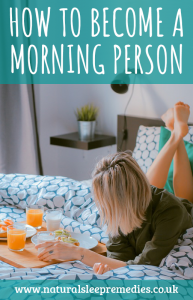 There are morning people and there are night owls. That’s just the way it is. That’s what I’ve always thought, and this belief gets repeated again and again, by both parties.
There are morning people and there are night owls. That’s just the way it is. That’s what I’ve always thought, and this belief gets repeated again and again, by both parties.
[Update: I wrote this article 4 years ago, and can confirm that it is possible to retrain your bodyclock! I’ve written a new article series on How I Overcame Insomnia in 10 Steps detailing exactly how I retrained my bodyclock.]
Morning people get to have an air of superiority and smugness about them, as if they’re somehow more productive than night owls, who are burdened with the feeling that morning people look down on them as ‘lazy’ and ‘undisciplined’. (Even though I can continue being productive for hours after those morning people have gone to bed.)
The work world is structured around the habits of morning people, despite the fact that more than 50% of those aged under 30 are night owls, and about 50% of those aged 30 to 50 are night owls. It’s only after the age of 50 that the balance tips in favour of morning people. Yet the positive associations with early rising are pervasive in our society, and makes getting up for work quite uncomfortable for a surprising percentage of people.
In a study published in 1998, no evidence was found to support Franklin’s claim that “early to bed and early to rise makes a man healthy, wealthy and wise”. Health, wealth and cognitive ability have no bearing on whether someone is a morning person or a night owl. A 1999 study showed a very slight correlation with higher cognitive abilities in fact belonged to the night owls.
However, other studies show that morning people frequently self-report more happiness and perceived healthiness than their night owl counterparts. This is thought to be influenced by the fact that society is set up more for the early bird routine, while night owls feel that their natural cycle is at odds with society. Also, night owls correlate highly with procrastination – something that probably won’t shock most night owls.
Studies also suggest that your chronotype (or how ‘morning’ or ‘night’ you are) is roughly 50% dependent on your genetics. So there is some predisposition to early rising or late sleeping; however the other 50% is down to habit, and can therefore be changed, and does change somewhat over the course of your lifetime.
Which is good news for those of us who want to kick our late-sleeping habits and shift our cycle round the clock to an earlier wake-up time.
Here’s how to do it:
1. Go to bed earlier
 Pretty obvious, huh? Work back 8 hours from the time you’d like to get up and that’s your new bedtime. Work back another hour to give yourself time to establish a getting ready for bed routine to help your body feel settled before trying to sleep.
Pretty obvious, huh? Work back 8 hours from the time you’d like to get up and that’s your new bedtime. Work back another hour to give yourself time to establish a getting ready for bed routine to help your body feel settled before trying to sleep.
It will take a few weeks to adjust to a new routine but the key is consistency. You won’t always be able to get to bed early every night but if you can manage 5 or 6 days a week that will increase the likelihood that you’ll stick to it.
It’s worth bearing in mind where you’re starting from – if your current bed time hovers somewhere around 1am, you’re going to find it very difficult to shift to 9pm in one fell swoop. It would be more realistic to shift back in increments of an hour, and maintain that for a few weeks, before shifting back a little further.
2. Wake up at the same time EVERY morning
And I mean, every morning. Weekends and holidays as well. This is the best way to accustom your body to a morning routine, and every time you sleep late (to ‘catch up’) what you’re actually doing is confusing your body into thinking that 10am is now your new wakeup time. Which is why going back to 7am again on Monday is so painful.
Set your alarm for the same time, seven days a week. To begin with, it will feel awful, especially when you’ve been out the night before – but you must force yourself to power through, and remind yourself that the more rigidly you stick to this, the more readily your body will adapt. This is driven by how well you stick to your bedtime, so make sure you keep on top of that so you’re getting enough sleep.
3. Stop pressing snooze
This is where the procrastination thing comes in. Every time you press snooze, you are putting off the inevitable. Yes, it somehow feels good to slip back into unconsciousness after the blaring noise of your alarm, when you know you have another ten minutes’ peace and quiet before you REALLY have to get up. But stop allowing yourself that time. The more you do it, the more your body will expect it, and the longer you are dragging out the inevitable fact that you have to get up.
In fact, the time you sleep after pressing snooze is doing nothing for you. It is not deep sleep, it’s never going to make you feel more refreshed however many times you press snooze. You’re going to feel just as tired when you wake up in ten minutes than you do now. Bite the bullet, turn off your alarm and simply get. Out. Of. Bed.
4. Have a morning routine
I’ve mentioned in other posts the importance of having a night time routine to give your body and mind an hour or so to wind down and relax, and prepare for the onset of sleep. Well it turns out that morning people often have a regular morning routine which helps them face the day. (And no, I’m not talking about three cups of strong coffee before you even get dressed!)
A good morning routine should include some sort of brisk physical activity to get the blood pumping around your body. You really don’t have to have a big early morning workout, but some yoga stretches, running on the spot, star jumps etc, can really help to wake your brain up with an infusion of oxygenated blood. Deep breathing is also good for this.
Also, make sure you eat breakfast. I have never been much of a breakfast person (would be interesting to see if this also correlates to night owls), but the studies clearly indicate that eating breakfast provides you with energy and brain power for the day ahead. Even if you can’t face a cooked breakfast or anything too stodgy, try to find a snack that you can stomach first thing, and have a bigger breakfast later in the morning. Fruit, yogurt, a cereal bar, or a piece of toast will help to kick start your metabolism.
Coffee does not count, and you should be looking to replace caffeinated beverages with decaf, or even something like ginseng, which will help to boost your energy in the morning without being followed by the caffeine crash later in the day. My favourite decaf coffee is Kenco Millicano Decaf Americano – it’s actually really good and you’d never know it was decaf by taste.
Finally, get some bright sunshine to help synchronise your Circadian Clock. If you live in a sun-free country like I do, invest in an SAD lamp and give yourself a daily blast of bright light therapy every morning. This will help to reset your Circadian Clock to a more conducive time, and will simultaneously help you feel sleepier earlier in the evening.
Other Tips and Tricks
The above steps are the main structure to getting your sleep cycle shifted round and settling into a new regime. Other ways to support this routine include:
-
- Cutting out caffeine altogether – start by gradually reducing the number of caffeine beverages you drink each day by stopping drinking them earlier and earlier. For the first week, stop drinking coffee (or tea or cola) after about 6pm. The next week, stop drinking caffeine from lunchtime onwards. The following week, replace your morning coffee with something caffeine free, such as ginseng which is naturally energising without containing caffeine.
- Taking melatonin – melatonin is the sleep hormone produced by the body as light levels fall to promote sleepiness and restful sleep. You can take melatonin supplements an hour or two before bedtime to help increase your melatonin levels and regulate your Circadian Clock. Don’t take melatonin long term, just use it for a few weeks to kick start your new cycle.
- Other vitamins and supplements – magnesium deficiency is marked by poor quality sleep, so taking magnesium supplements will ensure you have enough magnesium. You can also take a multivitamin, vitamin D3 drops are great to help boost your mood, especially in the dark winter days.
- For more herbal remedies and supplements to try, read this article on Natural Sleep Remedies.
I hope this information has been helpful!
